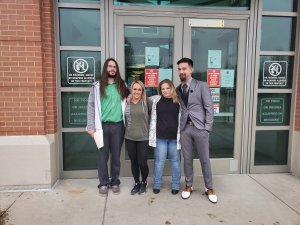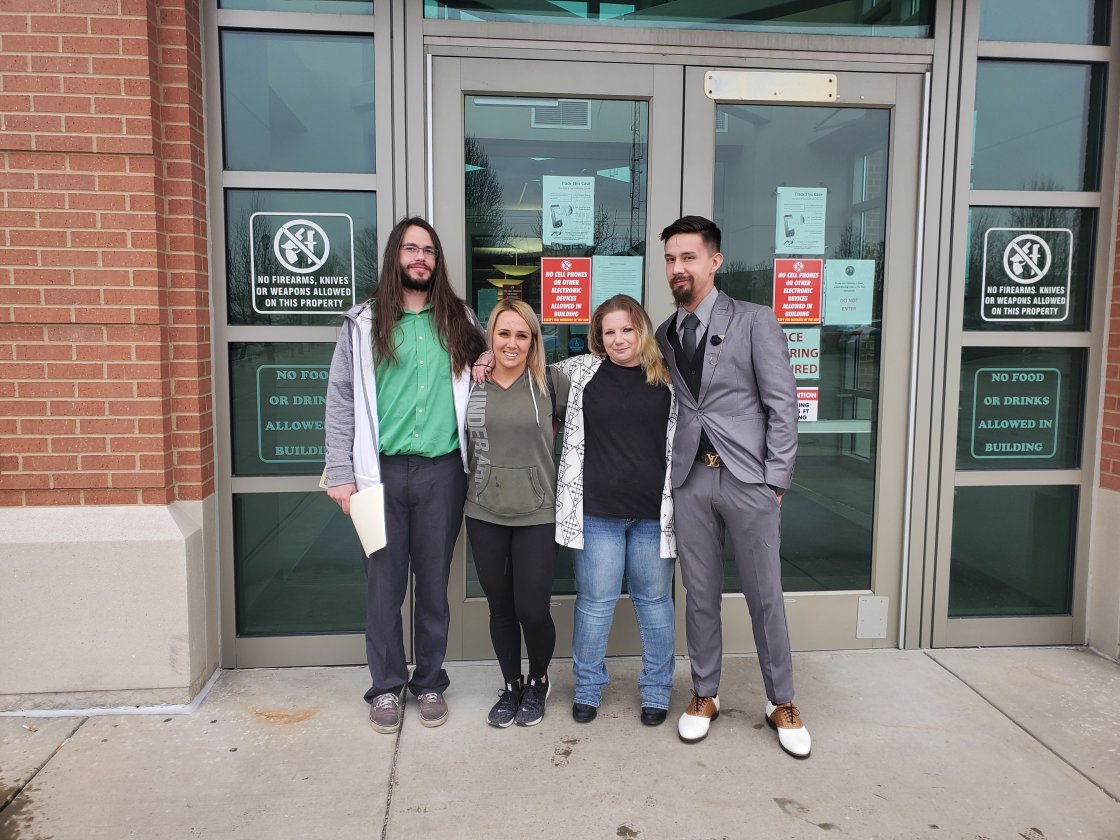
Treatment Court participants (left to right) Jordan Tracy, Margot Cole, Jamie Bain, & Jacob Beall
By AL Vineyard for Drug Free Ozarks
When a person has a substance use disorder, nearly every aspect of their life, including relationships, mental and emotional health, job skills, education, lifestyle, and parenting are affected.
If the person has children, the impact is even greater.
Children raised by parents with substance use disorders are often not taught basic life skills other children their age learn and often experience trauma related to the substance use and its consequences.
In an effort to help individuals whose lives are affected the most by substance use disorders, Taney County Treatment Court, commonly called drug court, assesses each participant, providing an individual treatment plan that focuses on the specific needs of that person.
Judge Eric Eighmy has presided over the Taney County Treatment Court for the past two-and-a-half years of the treatment court’s 21 year history. He’s seen the success of Stone and Taney counties’ treatment court systems, crediting Stone County Treatment Court Judge, Alan Blankenship, for being one of the best treatment court judges in the state. When Eighmy was offered the position, he humbly accepted, wanting to continue the success of his predecessor while reducing recidivism rates in Taney County.
Sit in on a monthly drug court proceeding and it will quickly become apparent how much Eighmy cares for the participants.
He can be seen cheering them on, encouraging them, and even stepping away from the bench to shake the hand of participant Jamie Bain’s new spouse who joined the proceeding.
Treatment Court Probation Officer Kathy Jeter says participants’ families are encouraged to join drug court functions, including court dates. The program includes education and therapy for the families. She explained that substance use disorders affect the families and the recovery process should include them as well.
Serving with Eighmy are others who help address the specific needs of each participant. Included in this team is a prosecutor, assistant prosecutor, clerk, two treatment providers, a probation officer, the drug court coordinator, and a defense counsel to represent participants when a sanction is being imposed. Each team member has a specific role in the process, but when they all come together for court, they collectively become the participants’ cheerleaders.
Jacob Beall arrived to March’s drug court proceeding dressed in a suit, wanting to prove he’s serious about the program and taking control of his life. The month before he looked very different, having just experienced a reoccurrence of symptoms. He thought the team would have written him off, but when he showed up dressed in the suit, the entire courtroom cheered as he walked to the front.
Drug court participants are not dismissed from the program for drug use. Instead, the drug court team works with the participant to identify triggers and establish new healthy ways to deal with the situation.
Beall is grateful for the program.
“I would probably be dead without it,” he said.
In order for a person to recover, it is important to identify and change harmful thought patterns regarding behaviors typically associated with substance use disorders. Cognitive Behavioral Therapy (CBT) and Moral Reconation Therapy (MRT) are part of the treatment program addressing these thought and behavior patterns.
Jordan Tracy, drug court participant, credits the program for helping him make better decisions. Tracy is soft spoken with a genuine smile that exhibits the joy he has achieving 21 weeks free of heroin use.
The drug court treatment plan consists of five phases. The process typically takes approximately 18 to 24 months. The phases build on one another. Each phase has a set number of mandatory substance free days, community service hours, and additional requirements in order to “phase up.”
Phasing up is a celebratory occasion.
Bain is in Phase 2 of the program, with six months of recovery time.
“As long as you fight it, it will be hard,” she said.
Today, it is apparent that she isn’t fighting the program, but rather, she is fighting for recovery with her husband by her side.
Margot Cole is two months shy of her two-year recovery date.
The drug court program has taught her a lot about her substance use disorder. Cole also credits the collaboration with sober-living houses, such as Standing by the Door, for helping her learn new and healthy life skills. Cole stays busy, working multiple jobs, keeping up with classes, appointments, community service work, and meetings required by the drug court program. Even with her busy schedule, she is never too busy to help a fellow participant, offering the few spare minutes that she has for emotional support.
Taney County Treatment Court creates a community, a bond between participants, teaching them healthy relationship habits and life skills.
In addition to learning healthy relational skills, participants who have children are offered parenting classes.
The drug court team works with participants to teach parenting skills and ensuring the home is fit for the parent and children. The team also works with the family court regarding custody matters.
Participants are required to attend two recovery meetings of their choice each week. It can be a Bible study, a spiritual meeting, Narcotics Anonymous, Alcoholics Anonymous, or Celebrate Recovery. During the pandemic, the meetings were held virtually, and the community is so strong that past graduates stayed connected to participants to encourage them through the difficult lockdown.
Once a participant has reached the final phase and completed all of the necessary requirements, the individual is eligible to graduate. Graduation is saved for the end of each drug court proceeding. Each team member stands to say a few words to the graduate. Family members are encouraged to join and speak. Graduates even invite the arresting officers, who gladly attends in full support of the changes the graduate has made.
Graduating does not exclude the graduate from future connections and resources. If a graduate needs to come back for MRT, they are encouraged to do so for no additional fees. They are invited to participate in court proceedings, meetings, and classes after graduation and are encouraged to continue with the social network and community the treatment court establishes.
Taney County Treatment Court works with people with the most intense substance use disorders who have been resistant to other treatment programs. This program uses a holistic approach, addressing every aspect of the participant’s life with evidence-based practices to change the lives of the participants, enhance the lives of their families, and reduce recidivism for the community.
The success is apparent in the numbers. Statewide, as of December 31, 2019, there were 22,221 graduates with approximately an 11% recidivism rate.
“Everybody impacts everybody,” said Jeter. “I love what I do. The joy comes from the participants’ success and them pouring into others.”
** Drug Free Ozarks is part of the Stone & Taney Counties Substance Use Initiative, which is aimed at reducing and preventing substance use in Stone and Taney counties. It is a project of CoxHealth and funded through a Skaggs Legacy Endowment grant. To learn more about the Substance Use Initiative, visit drugfreeozarks.org or on Facebook at DrugFreeOzarks.

